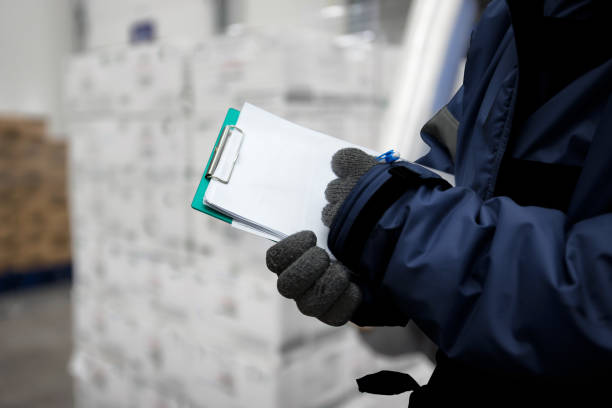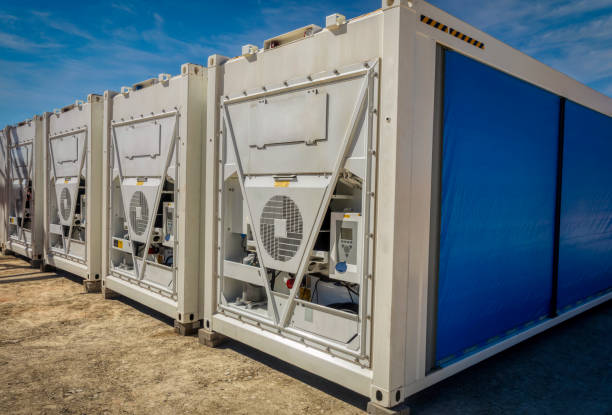

Maintaining the proper temperature for stored goods is crucial in temperature-controlled storage facilities. Whether it's perishable foods, pharmaceuticals, or other sensitive products, keeping them at the right temperature ensures their quality and safety.
When goods are stored at incorrect temperatures, they can spoil quickly, lose their effectiveness, or even become dangerous to consume. For example, dairy products can curdle, vaccines can become ineffective, and certain chemicals can degrade.
By maintaining proper temperature control in storage facilities, businesses can protect their investment in inventory and ensure that customers receive high-quality products. This not only helps to prevent financial losses but also builds trust with consumers who expect reliable and safe goods.
In addition to protecting the integrity of stored goods, proper temperature control also helps businesses comply with regulations and standards set by industry authorities. Failing to meet these requirements could result in fines or legal consequences.
Overall, the importance of maintaining proper temperature for stored goods cannot be overstated. It is essential for preserving product quality, ensuring consumer safety, and complying with regulations. By investing in quality temperature-controlled storage facilities and monitoring systems, businesses can enjoy peace of mind knowing that their inventory is protected and ready for distribution.
Temperature-controlled storage facilities play a crucial role in preserving perishable goods and ensuring their quality remains intact. These facilities come in various types, such as refrigerated warehouses and cold storage units, each designed to maintain specific temperature requirements for different types of products.
Refrigerated warehouses are large-scale facilities equipped with advanced cooling systems that can regulate temperatures to keep goods at optimal conditions. These warehouses are commonly used for storing fruits, vegetables, dairy products, meats, and other perishable items that require constant refrigeration to prevent spoilage.
On the other hand, cold storage units are smaller-scale facilities that offer temporary or long-term storage solutions for products that need to be kept at lower temperatures but do not require the same level of refrigeration as in a warehouse. These units are commonly used for storing items like pharmaceuticals, floral arrangements, seafood, and certain types of produce.
Both refrigerated warehouses and cold storage units play a vital role in maintaining the freshness and quality of perishable goods throughout the supply chain. By providing controlled environments that ensure consistent temperatures, these facilities help prevent food waste, reduce spoilage rates, and extend the shelf life of products.
In conclusion, temperature-controlled storage facilities are essential assets for businesses involved in handling perishable goods. Whether it's a refrigerated warehouse or a cold storage unit, these facilities provide a reliable solution for maintaining product integrity and meeting strict temperature requirements. With advancements in technology and innovations in cooling systems, these facilities continue to play a critical role in ensuring the safe transportation and storage of temperature-sensitive products.

Pharmaceutical cold storage solutions are of utmost importance in Chicago, IL for a variety of reasons.
First and foremost, these solutions ensure the efficacy and safety of pharmaceutical products that require specific temperature control to maintain their potency.. Medications such as vaccines, insulin, and various other sensitive drugs can easily degrade if not stored at the correct temperature.
Posted by on 2024-06-25

Cold storage facilities are essential for storing temperature-sensitive products, such as pharmaceuticals and food items.. In Chicago, IL, there are two main types of cold storage facilities: standard and pharmaceutical-grade.
Standard cold storage facilities are typically used for general storage purposes and may not have the same level of temperature control or monitoring as pharmaceutical-grade facilities.
Posted by on 2024-06-25

The ideal temperature range for storing pharmaceuticals in Chicago, IL is crucial to ensure the efficacy and safety of these medications.. As we know, pharmaceuticals are sensitive to temperature fluctuations and can easily degrade if not stored properly.
In general, the recommended temperature range for storing most pharmaceuticals is between 68°F to 77°F (20°C to 25°C).
Posted by on 2024-06-25

When it comes to pharmaceutical cold storage solutions in Chicago, IL, there are several key features that you should look for to ensure the safe and effective storage of temperature-sensitive medications and vaccines.
First and foremost, temperature control is essential.. The storage solution should be able to maintain a consistent temperature within a narrow range to prevent the degradation of the pharmaceuticals.
Posted by on 2024-06-25

Pharmaceutical cold storage facilities in Chicago, IL are subject to a variety of regulations to ensure the safety and efficacy of the medications stored within them.. These regulations are put in place by various governing bodies at the local, state, and federal levels.
At the federal level, pharmaceutical cold storage facilities must comply with guidelines set forth by the Food and Drug Administration (FDA).
Posted by on 2024-06-25

Outsourcing pharmaceutical cold storage solutions in Chicago, IL can offer a multitude of benefits for companies in the healthcare industry.. With the increasing demand for reliable and safe storage of temperature-sensitive medications and vaccines, outsourcing this critical function to a specialized provider can help businesses streamline their operations and ensure the integrity of their products.
One of the main advantages of outsourcing pharmaceutical cold storage solutions is cost savings.
Posted by on 2024-06-25

When choosing a provider for pharmaceutical cold storage in Chicago, IL, there are several important factors that should be considered to ensure the safety and efficacy of your products.
First and foremost, it is essential to consider the provider's reputation and track record.. Look for a company with a proven history of providing high-quality cold storage services for pharmaceutical products.
Posted by on 2024-06-25

As we all know, storing pharmaceuticals properly is crucial to ensure their effectiveness and safety for consumption.. In Chicago, where temperature fluctuations can be extreme, it is particularly important to have access to cold storage solutions that can maintain the integrity of medications.
Thankfully, there are now cold storage solutions available in Chicago that can help individuals and businesses safely store their pharmaceuticals.
Posted by on 2024-06-25
Temperature-controlled storage facilities offer a multitude of benefits for individuals and businesses alike. These specialized facilities provide a controlled environment that ensures items are kept at the optimal temperature to prevent damage or spoilage.
One of the key benefits of using temperature-controlled storage facilities is the ability to store sensitive items such as pharmaceuticals, food products, and electronics safely. By maintaining a consistent temperature, these facilities help extend the shelf life of perishable goods and protect valuable items from extreme temperatures that could cause deterioration.
Additionally, temperature-controlled storage facilities offer peace of mind for businesses storing inventory or equipment that requires specific climate conditions. With advanced monitoring systems in place, these facilities can regulate humidity levels and ensure that items are stored in a stable environment.
Furthermore, utilizing temperature-controlled storage facilities can also lead to cost savings in the long run. By preventing damage or spoilage due to improper storage conditions, businesses can avoid costly replacements or repairs.
Overall, the benefits of using temperature-controlled storage facilities are clear. Whether you need to store sensitive inventory for your business or preserve valuable belongings, these facilities provide a reliable solution for keeping items safe and secure.
When it comes to choosing a temperature-controlled storage facility, there are several factors that should be taken into consideration. One of the most important things to think about is the specific temperature requirements for the items you will be storing. Different items have different temperature needs, so make sure the facility can accommodate your specific needs.
Another key factor to consider is the size and layout of the storage unit. Make sure that the facility has units available in sizes that will fit your belongings and that they are set up in a way that makes it easy to access your items when needed.
It's also important to look at the security measures in place at the facility. You want to make sure that your belongings will be safe and secure while being stored there. This includes looking at things like surveillance cameras, access control systems, and on-site security personnel.
Additionally, consider the location of the storage facility. Is it easily accessible from your home or business? Will you need to visit frequently to access your items? Make sure that the location works for you and fits into your schedule.
Finally, think about any additional amenities or services offered by the storage facility. This could include things like climate-controlled loading docks, packing supplies for sale on-site, or even assistance with moving your items into storage.
By considering these factors when choosing a temperature-controlled storage facility, you can ensure that your items are kept safe and secure while being stored at the proper temperature.
When it comes to storing items in a temperature-controlled environment, there are some important tips to keep in mind to ensure the safety and integrity of your belongings.
First and foremost, it is crucial to properly label and organize your items before placing them in storage. This will not only make it easier for you to locate specific items when needed, but it will also help prevent damage or loss during the storage process.
Secondly, be mindful of the temperature settings in the storage facility. Different items require different temperature ranges for optimal preservation. Make sure to consult with the facility staff or do your own research to determine the ideal temperature for your specific items.
Additionally, consider using proper containers or packaging materials to protect your belongings from dust, moisture, pests, and other potential hazards. This may include using plastic bins, vacuum-sealed bags, or bubble wrap depending on the nature of the items being stored.
Lastly, regularly check on your stored items to ensure they are still in good condition. If you notice any signs of damage or deterioration, take immediate action to address the issue before it worsens.
By following these tips and taking proper precautions, you can rest assured that your belongings are being stored safely and securely in a temperature-controlled environment.
Operating a temperature-controlled storage facility comes with its own set of challenges that operators must navigate to ensure the safe storage of perishable goods. One common challenge faced by operators is maintaining the required temperature levels within the facility. Fluctuations in temperature can lead to spoilage of products, resulting in financial losses for both the operator and their clients.
Another challenge is ensuring proper air circulation and ventilation within the facility. Poor air flow can create pockets of uneven temperatures, leading to hot spots or cold spots that can impact the quality of stored goods. Operators must also regularly inspect and maintain their refrigeration units to prevent breakdowns that could compromise the integrity of the stored products.
Additionally, operators must stay vigilant against pests and rodents that are attracted to food items stored in temperature-controlled facilities. Infestations can quickly spread and contaminate large quantities of goods, posing a health hazard to consumers and damaging the reputation of the operator.
Furthermore, compliance with regulations and industry standards is crucial for operators of temperature-controlled storage facilities. Failure to adhere to these guidelines can result in fines or even closure of the facility, putting both business operations and product safety at risk.
In conclusion, operating a temperature-controlled storage facility requires careful management of various challenges such as maintaining proper temperatures, ensuring adequate ventilation, preventing pest infestations, and meeting regulatory requirements. By staying proactive and implementing effective strategies to address these challenges, operators can provide a secure environment for storing perishable goods while safeguarding their business reputation.